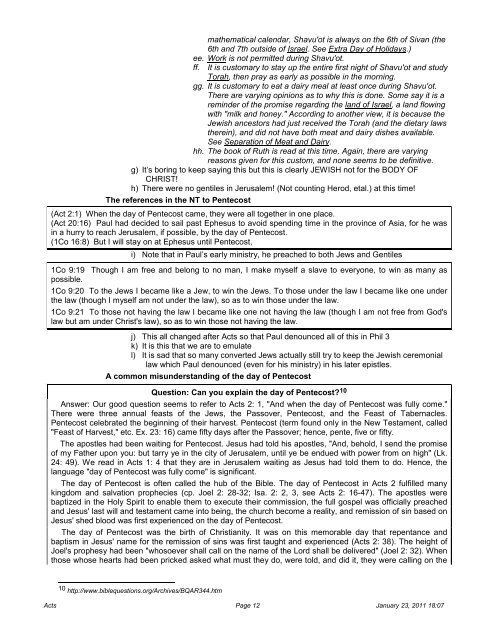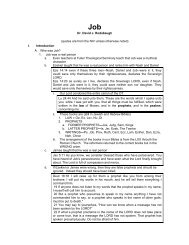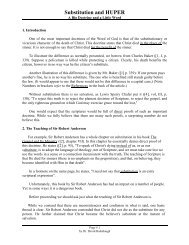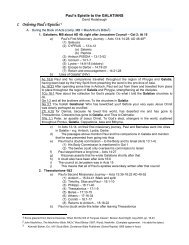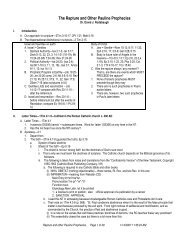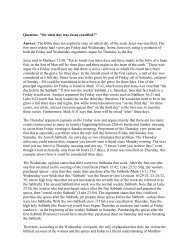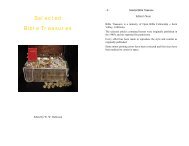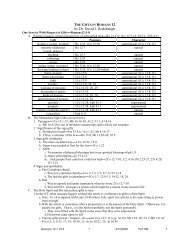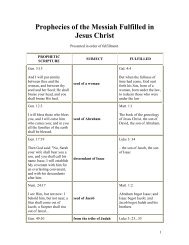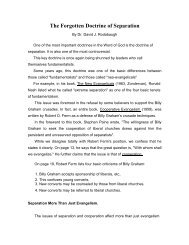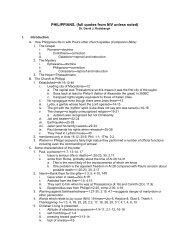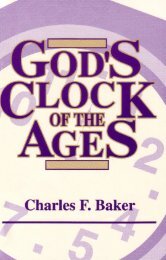Create successful ePaper yourself
Turn your PDF publications into a flip-book with our unique Google optimized e-Paper software.
ma<strong>the</strong>matical calendar, Shavu'ot is always on <strong>the</strong> 6th <strong>of</strong> Sivan (<strong>the</strong>6th and 7th outside <strong>of</strong> Israel. See Extra Day <strong>of</strong> Holidays.)ee. Work is not permitted during Shavu'ot.ff. It is customary to stay up <strong>the</strong> entire first night <strong>of</strong> Shavu'ot and studyTorah, <strong>the</strong>n pray as early as possible in <strong>the</strong> morning.gg. It is customary to eat a dairy meal at least once during Shavu'ot.There are varying opinions as to why this is done. Some say it is areminder <strong>of</strong> <strong>the</strong> promise regarding <strong>the</strong> land <strong>of</strong> Israel, a land flowingwith "milk and honey." According to ano<strong>the</strong>r view, it is because <strong>the</strong>Jewish ancestors had just received <strong>the</strong> Torah (and <strong>the</strong> dietary laws<strong>the</strong>rein), and did not have both meat and dairy dishes available.See Separation <strong>of</strong> Meat and Dairy.hh. The book <strong>of</strong> Ruth is read at this time. Again, <strong>the</strong>re are varyingreasons given for this custom, and none seems to be definitive.g) It’s boring to keep saying this but this is clearly JEWISH not for <strong>the</strong> BODY OFCHRIST!h) There were no gentiles in Jerusalem! (Not counting Herod, etal.) at this time!The references in <strong>the</strong> NT to Pentecost(Act 2:1) When <strong>the</strong> day <strong>of</strong> Pentecost came, <strong>the</strong>y were all toge<strong>the</strong>r in one place.(Act 20:16) Paul had decided to sail past Ephesus to avoid spending time in <strong>the</strong> province <strong>of</strong> Asia, for he wasin a hurry to reach Jerusalem, if possible, by <strong>the</strong> day <strong>of</strong> Pentecost.(1Co 16:8) But I will stay on at Ephesus until Pentecost,i) Note that in Paul’s early ministry, he preached to both Jews and Gentiles1Co 9:19 Though I am free and belong to no man, I make myself a slave to everyone, to win as many aspossible.1Co 9:20 To <strong>the</strong> Jews I became like a Jew, to win <strong>the</strong> Jews. To those under <strong>the</strong> law I became like one under<strong>the</strong> law (though I myself am not under <strong>the</strong> law), so as to win those under <strong>the</strong> law.1Co 9:21 To those not having <strong>the</strong> law I became like one not having <strong>the</strong> law (though I am not free from God'slaw but am under Christ's law), so as to win those not having <strong>the</strong> law.j) This all changed after Acts so that Paul denounced all <strong>of</strong> this in Phil 3k) It is this that we are to emulatel) It is sad that so many converted Jews actually still try to keep <strong>the</strong> Jewish ceremoniallaw which Paul denounced (even for his ministry) in his later epistles.A common misunderstanding <strong>of</strong> <strong>the</strong> day <strong>of</strong> PentecostQuestion: Can you explain <strong>the</strong> day <strong>of</strong> Pentecost? 10Answer: Our good question seems to refer to Acts 2: 1, "And when <strong>the</strong> day <strong>of</strong> Pentecost was fully come."There were three annual feasts <strong>of</strong> <strong>the</strong> Jews, <strong>the</strong> Passover, Pentecost, and <strong>the</strong> Feast <strong>of</strong> Tabernacles.Pentecost celebrated <strong>the</strong> beginning <strong>of</strong> <strong>the</strong>ir harvest. Pentecost (term found only in <strong>the</strong> New Testament, called"Feast <strong>of</strong> Harvest," etc. Ex. 23: 16) came fifty days after <strong>the</strong> Passover; hence, pente, five or fifty.The apostles had been waiting for Pentecost. Jesus had told his apostles, "And, behold, I send <strong>the</strong> promise<strong>of</strong> my Fa<strong>the</strong>r upon you: but tarry ye in <strong>the</strong> city <strong>of</strong> Jerusalem, until ye be endued with power from on high" (Lk.24: 49). We read in Acts 1: 4 that <strong>the</strong>y are in Jerusalem waiting as Jesus had told <strong>the</strong>m to do. Hence, <strong>the</strong>language "day <strong>of</strong> Pentecost was fully come" is significant.The day <strong>of</strong> Pentecost is <strong>of</strong>ten called <strong>the</strong> hub <strong>of</strong> <strong>the</strong> Bible. The day <strong>of</strong> Pentecost in Acts 2 fulfilled manykingdom and salvation prophecies (cp. Joel 2: 28-32; Isa. 2: 2, 3, see Acts 2: 16-47). The apostles werebaptized in <strong>the</strong> Holy Spirit to enable <strong>the</strong>m to execute <strong>the</strong>ir commission, <strong>the</strong> full gospel was <strong>of</strong>ficially preachedand Jesus' last will and testament came into being, <strong>the</strong> church become a reality, and remission <strong>of</strong> sin based onJesus' shed blood was first experienced on <strong>the</strong> day <strong>of</strong> Pentecost.The day <strong>of</strong> Pentecost was <strong>the</strong> birth <strong>of</strong> Christianity. It was on this memorable day that repentance andbaptism in Jesus' name for <strong>the</strong> remission <strong>of</strong> sins was first taught and experienced (Acts 2: 38). The height <strong>of</strong>Joel's prophesy had been "whosoever shall call on <strong>the</strong> name <strong>of</strong> <strong>the</strong> Lord shall be delivered" (Joel 2: 32). Whenthose whose hearts had been pricked asked what must <strong>the</strong>y do, were told, and did it, <strong>the</strong>y were calling on <strong>the</strong>10 http://www.biblequestions.org/Archives/BQAR344.htmActs Page 12 January 23, 2011 18:07


